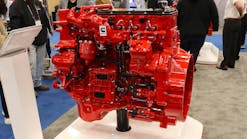Scania has been granted SEK 30 million—about EUR 3.3 million—by Sweden’s Strategic Vehicle Research and Innovation Initiative (FFI) to develop a biofuel engine intended for heavy commercial vehicles. This research will show how the best characteristics of the diesel and the Otto principle can be combined in an engine that can operate on both alcohol- and gaseous methane-based fuels.
The company will focus on developing an engine using sustainable biofuels that will combine the high energy efficiency of diesel (compression ignition) technology with the more efficient exhaust aftertreatment system of Otto (spark ignition) technology.
Scania has been granted FFI funding for the phase of its research project that involves the development of technology for both alcohol- and methane gas-based fuels. This research includes systems for pre-mixed combustion and ignition of fuel, gas exchange systems, optimized valve performance, exhaust gas recirculation, and use of advanced catalyst technology for efficient exhaust aftertreatment.
In its project, Scania is working with experts in combustion and emission technology at the Royal Institute of Technology (KTH) in Stockholm, Lund University, and Chalmers University of Technology in Gothenburg, Sweden.
The project is part of a bilateral arrangement between Sweden and Brazil in which Scania has been engaged for some time in environmental collaboration with Vale Soluções em Energia SA (VSE) on further developing ethanol- and gas-fueled industrial engines.
FFI) is a partnership between the public sector (the Swedish Governmental Agency for Innovation Systems, VINNOVA; the Swedish Transport Administration; and the Swedish Energy Agency) and the vehicle industry (Scania, AB Volvo; Volvo Car Corp; Saab; and FKG, a trade association representing Scandinavian automotive suppliers). Its purpose is to jointly finance research, innovation, and development activities, focusing on climate, environment, and safety.
More information is at www.vinnova.se/en/ffi/.







